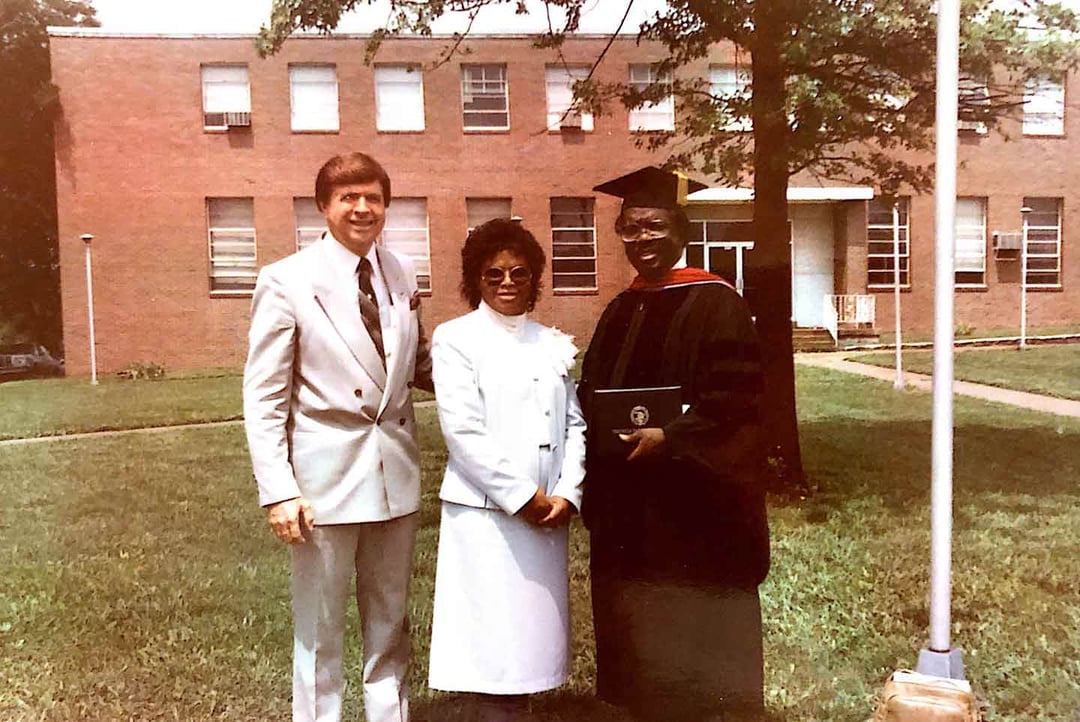Honoring the Life of Civil Rights Activist and Friend of Trevecca Dr. Charles Johnson
| History

Dr. Charles Johnson was a giant in the civil rights movement, fighting for equality alongside Martin Luther King, Jr. and many others. He was recognized by Trevecca in 1986 for his commitment to justice and awarded an honorary Doctor of Divinity degree. In 2013, he received the Excellence in Social Justice Award from Trevecca’s J.V. Morsch Center for Social Justice.
Johnson’s story began in Meridian, Mississippi, where he pastored Fitkins Church of the Nazarene. He moved to Meridian during a time of great upheaval in the fight for racial equality. In addition to his passion for ending injustice, Johnson cared deeply for his congregation and call to preach.
“Charles Johnson pastored with righteous fervor. His audacity in calling a community to account for racial injustice matched his tenacity in calling sinners to repent,” said Chet Bush, author of Called to the Fire: A Witness for God in Mississippi, a biography of Johnson’s life. “He did both – whether on the street in the picket line, or from the pulpit – with confidence in the saving and heart-transforming work of the Holy Spirit.”
Johnson saw how the lack of voting rights affected those in his congregation and was actively involved in bringing about change in Meridian. The Freedom Summer arrived in 1964, a volunteer campaign to register as many African American voters in Mississippi as possible. He invited Michael Schwerner, a white man, to join the efforts.
“Rev. Johnson worked alongside Michael, and they did freedom summer schooling and boycotts of businesses that didn’t hire Black employees,” said Jamie Casler, Director of the J.V. Morsch Center for Social Justice. “Michael often ate dinner and slept at his house. There was a close relationship between Charles Johnson and Michael Schwerner.”
Months after arriving, Schwerner was murdered by the Ku Klux Klan along with civil rights workers James Chaney and Andrew Goodman. That event would become a turning point in the fight for voting rights.
“They went missing on June 20 and the bodies were not discovered till August 4, so there was six weeks of media coverage,” said Casler. “There became an awareness of social justice issues in the South and the fact that these men had been murdered for their involvement rocked the conscience of the nation.”
A few years later, a trial was held. In an all white courtroom with an all white jury, Charles Johnson was called upon to testify.
“The U.S. Justice Department called Charles Johnson to the witness stand to clarify the type of work the three men had been doing when they were murdered,” Bush said. “Johnson’s time on the stand became a flashpoint for the trial. The defense lawyer badgered Charles, and the judge – who formerly had been antagonistic to civil rights cases – reacted strongly against the tactics of the defense.”
Ultimately, only seven of the 21 defendants were convicted. Years later, while Johnson was in his yard with his young daughter, one of those convicted men, the one who had pulled the trigger on the civil rights workers, approached him. What followed spoke volumes about Johnson’s faith and depth of character.
“One of the most ruthless KKK members, Alton Roberts, went to prison and found the Lord,” said Casler. “When he was released, he went to Charles Johnson’s home and asked for his forgiveness. And Dr. Johnson, whose friends had been brutally murdered, said, ‘I forgive you.”
In all he did, Johnson’s heart for others was evident throughout the circumstances and hardships of his life. Originally, he had not wanted to go to Mississippi out of fear of the racism he could encounter, but he embraced the will of God nevertheless.
“He was a very humble man, very patient and loving, it just flowed from him,” said Casler. “I saw a man of deep compassion and love for the church and for his people. I also see a man who persevered and took God’s call on his life seriously.”
After a life lived well, a life of service to the church and his beloved community, Johnson passed away on January 12, 2022 at the age of 83. He left behind a remarkable legacy of resilience, forgiveness and love above all else.
“He continued to advocate for social change till the end of his ministry, it was not just a season of life, it was his life,” said Casler. “He was an agent of social change through the church and he gave his life for the work. He was the Martin Luther King, Jr. of Meridian, Mississippi.”
